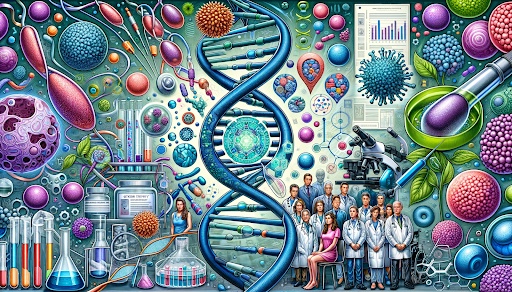The field of life sciences research is at the forefront of catalyzing significant advancements in personalized medicine, a medical model that proposes the customization of healthcare, with decisions and treatments tailored to individual patients. In this era of rapid technological progress and scientific discovery, life sciences research is providing the insights and tools necessary to understand the complex interplay between genetics, environment, and lifestyle in health and disease. This article delves into how life sciences research is shaping the future of personalized medicine, highlighting key areas of impact, challenges, and the potential for transforming patient care.
Decoding the Genetic Blueprint
Genomics and Genetic Sequencing
At the heart of personalized medicine lies genomics, the study of an individual's genes and their functions. Life sciences research has made remarkable strides in genomics, particularly through advancements in DNA sequencing technologies. High-throughput sequencing, also known as next-generation sequencing (NGS), allows for the rapid and cost-effective analysis of large segments of DNA, making it feasible to sequence an individual's entire genome. This has paved the way for identifying genetic variations and mutations that can influence the risk of developing certain diseases, predict responses to medications, and guide the development of targeted therapies.
Biomarkers and Precision Diagnostics
Biomarkers, measurable indicators of biological states or conditions, are another crucial component of personalized medicine. Research in life sciences has led to the discovery of numerous biomarkers that can aid in the early detection of diseases, monitor disease progression, and predict therapeutic responses. For instance, the identification of specific genetic markers in cancers can help determine the most effective treatment regimen for a particular patient, thereby improving outcomes and reducing the risk of adverse reactions.
Tailoring Therapies to the Individual
Targeted Therapies and Pharmacogenomics
One of the most promising applications of personalized medicine is the development of targeted therapies. These treatments specifically address the underlying mechanisms of a disease at the molecular level, often focusing on abnormal proteins or genes that drive disease progression. Life sciences research has been instrumental in identifying these molecular targets and designing drugs that can inhibit or modulate their activity.
Pharmacogenomics, the study of how genes affect a person's response to drugs, is another area where life sciences research is making a significant impact. By understanding the genetic factors that influence drug metabolism and efficacy, healthcare providers can prescribe medications that are more likely to be effective and less likely to cause side effects, optimizing patient care.
Regenerative Medicine and Gene Editing
Regenerative medicine, including stem cell therapy and tissue engineering, offers the potential to repair or replace damaged tissues and organs, providing hope for conditions that currently have no cure. Life sciences research in gene editing, particularly with technologies like CRISPR-Cas9, is also revolutionizing personalized medicine by offering the possibility of correcting genetic defects at their source.
Overcoming Challenges
Ethical, Legal, and Social Implications
The integration of personalized medicine into clinical practice is not without challenges. Ethical concerns arise regarding genetic privacy, discrimination, and access to personalized therapies. Legal frameworks and policies must evolve to protect individuals' genetic information while fostering innovation in medical research and treatment.
Data Management and Computational Challenges
The vast amount of genetic and clinical data generated through personalized medicine initiatives presents significant data management and computational challenges. Robust bioinformatics tools and systems are needed to store, analyze, and interpret this data effectively. Interdisciplinary collaboration between biologists, computer scientists, and data analysts is crucial for overcoming these hurdles and translating data into actionable medical insights.
The Future of Personalized Medicine
The ongoing research in life sciences is setting the stage for a future where personalized medicine becomes the norm rather than the exception. Continued advancements in genomics, biomarker discovery, and targeted therapies hold the promise of more effective, safer, and customized healthcare.
As we move forward, it is essential to address the ethical, legal, and social challenges that accompany these advancements. Ensuring equitable access to personalized medicine, protecting patient privacy, and fostering public trust will be key to realizing the full potential of these breakthroughs.
Conclusion
In the realm of healthcare technology, Holon Solutions stands out as a beacon of innovation, deeply rooted in the philosophy of enhancing the human element within healthcare services. The company's name, inspired by the concept of a "holon," signifies the dual nature of being an independent entity while also being an integral part of a larger system. This philosophy is the driving force behind Holon's commitment to fostering human connections through cutting-edge technology.
Holon Solutions has pioneered a sophisticated platform that transcends the boundaries of conventional healthcare technology offerings. This platform is designed to streamline healthcare processes by providing tailored tools that simplify complex procedures. With its proprietary sensor technology, Holon aggregates patient data from a myriad of sources, seamlessly integrating it into personalized clinical workflows. This strategic automation not only saves valuable time for medical professionals but also addresses the prevalent issue of burnout, thereby allowing healthcare providers to refocus their efforts on delivering superior patient care.
What sets Holon apart in the competitive landscape is its unwavering dedication to reducing the administrative burdens that healthcare professionals endure. By leveraging smart technology and intuitive design, Holon introduces customized tools, services, and insights that aim to achieve tangible business outcomes while profoundly enhancing human interactions and healthcare outcomes.
At the heart of Holon's approach lies the Holon Community, an ecosystem designed to optimize healthcare processes. This community facilitates the efficient delivery of patient data from various sources to any point of care, integrating effortlessly with existing infrastructures and protocols. This streamlined approach not only boosts professional fulfillment but also allocates more time for patient-focused care, underscoring Holon's commitment to humanizing healthcare.
Innovation is a cornerstone of Holon's ethos, prominently showcased in the company's Innovation Lab. This creative space empowers Holon's teams to push the boundaries of technology and design, always with an emphasis on the human aspect of healthcare services. Guided by foundational principles such as bold thinking, simplification, customer empathy, agility in a SaaS environment, and the humanization of interactions, the Innovation Lab is a crucible for developing groundbreaking solutions. This innovative spirit is reflective of Holon's ambition to spearhead transformative changes in the healthcare sector.
Holon's relentless pursuit of reimagining healthcare experiences is evident in its efforts to address professional burnout, alleviate administrative pressures, and enhance patient care. The company remains steadfast in its vision of infusing healthcare innovation with a more humane touch, thereby reviving the essential human connections that lie at the heart of healthcare services. Through its unique approach and dedication to innovation, Holon Solutions is not just paving the way for technological advancements in healthcare but is also redefining what it means to deliver compassionate, patient-centered care in the modern era.


No comments yet